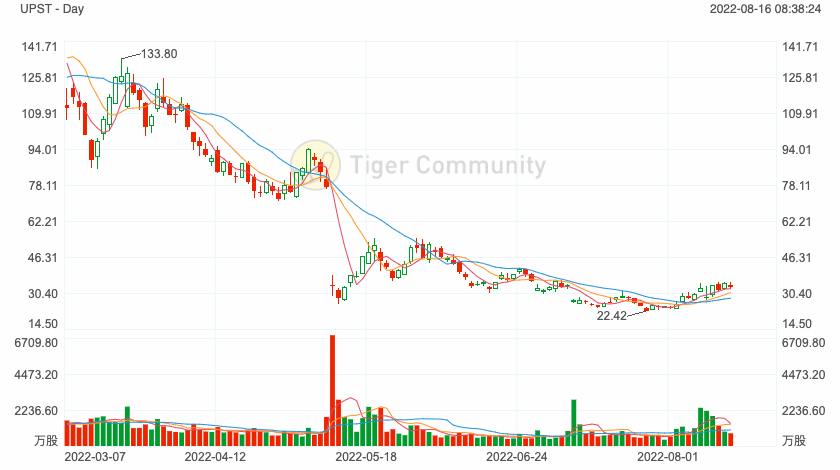1 Green Flag for Upstart In 2022, and 1 Red Flag
Upstart's platform has held up amid the pressure, but can it right the ship?
$Upstart Holdings, Inc.(UPST)$ has become one of the more notable disappointments in the current bear market. A generalized decline in growth tech stocks and management missteps have led to a stock price drop of 92% since October.
Such movements have dashed much of the hype surrounding this stock. Nonetheless, it continues to grow revenue, and a critical green flag could make it a worthwhile investment despite a glaring red flag that has increasingly weighed on thefintech stock.
Green flag: Upstart's evaluation tool
Upstart derives nearly all of its revenue from its loan evaluation tool. That tool utilizes artificial intelligence (AI) and machine learning tools to evaluate loan applications.
The company got its start evaluating personal loans, but it has since expanded into auto loans. Additionally, it entered the market for small business loans in June. Management has also expressed a goal of entering the mortgage market in the past. Each of these moves dramatically expands its total addressable market.
In theory, its evaluation tool should capture risks that traditional scoring models such asFair Isaac's(FICO-0.20%)FICO score might miss. Upstart's model appears to have worked well in this regard, at least according to an updated analysis recently released by Upstart.
Upstart's study looked at loan applicants that were scored by FICO and also graded by Upstart, and it followed their progress as they paid off loans. What it found was that applicants receiving the highest FICO scores but low Upstart grades defaulted at a much higher rate (as much as 13x for high FICO scores and 16x for all scores combined). Similarly, those receiving top Upstart grades but low FICO scores defaulted at a rate not that much worse than those receiving high FICO scores (1.3% vs. 0.7% respectively).
To this end, the updated data from Upstart suggests its applicant analysis model is "well-calibrated" for the current economic cycle, which includes higher loan rates and tougher economic situations that can lead to more defaults. This means it is likely passing a critical test in the model's durability and ability to gain business from banks longer-term.
CEO Dave Girouard said on the second-quarter 2022 earnings callthat banks have reduced or temporarily stopped originations for unsecured loans. Still, this has not led to canceled agreements, and that's a hopeful sign for Upstart's revenue growth prospects as conditions improve.
 Red flag: Upstart's management
Red flag: Upstart's management
Nonetheless, Upstart faces considerable challenges, and one might assume the declining loan volumes or its dependence on one bank for most of its business is its primary Achilles heel. While these factors pose potential dangers, management's behavior has caused many of the more notable missteps.
Management has failed to put forth a consistent vision for the company. It defined itself as a loanevaluator, implying it was not underwriting the loans themselves. However, the company's first-quarter report showed it was holding loans as it rolled out its auto loan platform.
That action sent the stock plummeting following Q1 earnings. After that reaction, management communicated its intent to sell those loans, likely at a loss. Nonetheless, the Q2 results produced mixed results on keeping this promise. Overall, loans on the balance sheetincreasedto nearly $624 million.
Additionally, the company seems to have failed to manage expectations around the slowdown. Amid the bad news from Q1, one might have expected the pain would stop worsening after Q2.
However, managementguidance just got worsefor the third quarter, taking it down to $170 million. If that estimate holds, it will mean a revenuedecreaseof 25%, a dramatic turnabout from six months ago when the company had reported triple-digit revenue growth.
Consequently, instead of placing the company on firm footing, the Q2 report leaves investors uncertain about when Upstart's pain will end. It also calls into question whether management is serious about removing the rising numbers of loans from the balance sheet.
Should I consider Upstart?
Given management missteps, investors should treat Upstart as a higher-risk play and invest accordingly. The good news for investors is that its model appears to outperform FICO. This could bring outsized returns as more banks turn to Upstart to lower default risks.
However, the company still faces significant uncertainty, especially with declining revenue and a seeming unwillingness to sell more of its loans. Until management can improve its performance, only risk-tolerant investors should buy, and even they may want to consider a speculative position until conditions improve.
Disclaimer: Investing carries risk. This is not financial advice. The above content should not be regarded as an offer, recommendation, or solicitation on acquiring or disposing of any financial products, any associated discussions, comments, or posts by author or other users should not be considered as such either. It is solely for general information purpose only, which does not consider your own investment objectives, financial situations or needs. TTM assumes no responsibility or warranty for the accuracy and completeness of the information, investors should do their own research and may seek professional advice before investing.

Great indication of information